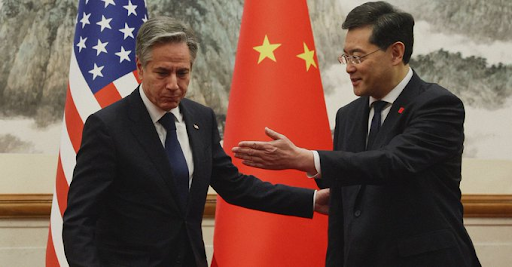WHAT DOES CHINA WANT?
Meeting between the US Secretary of State and his Chinese counterpart. (Photo: Leah Millis, Pool, The Atlantic)
A recent article in the American magazine The Atlantic raised
questions about Beijing's real intentions in its current rivalry with the
United States of America: ''China doesn't want to compete. It wants to win''.
Simply put, China has no wish to start a war, except maybe in the case
of Taiwan, seen as a wayward province, and it is certainly not seeking military
confrontation with the US. That's for a very good reason: it is winning the
peace, in a mainly peaceful manner, using mainly peaceful economic means.
But then, why attack the US? Clearly, Beijing's objective is not to
crush America and turn it into a bloody pulp, but simply to isolate it and, by
doing so, render it impotent militarily. The goal of the Chinese game of go is
not to kill the opposite king/player, but to make him toothless by controlling
more territory (the assets that goes with it, like mines, ports,
grain-producing zones, mountain passes, industrial areas, etc.) than he does.
China is not in the business of exterminating neighboring nations. If
those are relatively few in numbers, the Chinese will overwhelm them with waves
of migrants (regions of Tibet, Inner Mongolia, and Sinkiang; islands of Formosa
and Hainan, among other examples). If the neighbouring peoples have large and well-organized
populations, a network of garrisons with soldiers will be needed (in the case
of Vietnam, for instance, occupied for a millennia).
When invaded and conquered by hordes of nomads, the Chinese slowly
absorb them by a mix of patience, force of inertia, and superior culture (in
the case of the invasions by the Mongols and the Manchus). Nowadays, most
Manchus lives now outside Manchuria and have become heavily sinicized, having
lost both their language and their culture, while their former homeland,
previously closed to Chinese, have been slowly settled by farmers and
city-dwellers in the last decades of the XIXth century and the first decades of
the XXth century.
The age-old civilization that is called China is the result of thousands
of years of history, and it is borne by a quite large population. The Chinese
are divided by the great variety of languages they use but are united by the
fact that all those languages are written with the same symbols. Those characteristics
are at the base of the strength and resiliency of that remarkable people, the
Han.
A member of a small national minority in China once wrote that,
individually, each Chinese is basically a very nice person. The only problem
with them is their huge numbers: there are millions of them, tens of millions
of them, hundred of millions of them. Their very presence, all around, means
that their influence can sometimes be a disturbing experience for the many
ethnic minorities living in China, because of sheer weight of number.
A last word about India, the brand-new most populated country in the
world. That country is in a very different category, because of its many
religions, ethnicities, languages, cultures, writing systems, etc. Thus, India
can be described as a kind of patchwork made by weaving together a lot of
different, small fabrics. China, for her part, can be seen as a huge tree
growing slowly, at its own pace, around a strong, central core, and with deep
roots going back to the very beginning of the ancient Han civilization.
* * *
https://www.theatlantic.com/international/archive/2023/07/-us-china-economic-agenda-competition/674694/
* * *
PLUS: @charles.millar3 (Twitter)




Commentaires
Enregistrer un commentaire
Bonjour, tous les commentaires sont acceptés, dans la mesure où ils sont d'ordre professionnel. Insulteurs s'abstenir...